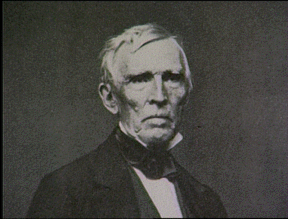![]()

John J. Crittenden was born in Kentucky in 1787, his father having emigrated there following the American Revolution. He was educated in Kentucky, as well as at William and Mary College in Virginia. Having studied law, he began his practice in 1807, and quickly became the best known lawyer in western Kentucky. He also turned his attention to politics, and beginning in 1811, he was elected to the state legislature for six successive terms. He was chosen speaker of the House in 1815 and 1816. During these years, Crittenden also performed military service in the War of 1812, receiving a special governor's commendation for his actions during the battle of the Thames.
Following the war, Crittenden served for two years in the United States Senate, before returning to Kentucky in 1819 to practice law. The internal political strife in Kentucky between the Old Court and New Court factions, however, drew Crittenden back to politics. Siding with the conservatives, he reentered the legislature, where from 1829-32, he was again speaker of the House. In national politics, he aligned himself with Henry Clay and the administration of John Quincy Adams against Andrew Jackson.
Beginning in 1835, with his election to the United States Senate, Crittenden's political career was generally connected with the federal government. He was a leading Whig opponent of the Jackson and Van Buren administrations, and after campaigning aggressively for the Whig candidate, William Henry Harrison, in 1840, he was appointed Harrison's attorney general. Harrison's death, followed by President John Tyler's conflict with the Whig Party, brought about Crittenden's resignation in September 1841. He reentered the Senate the following year, where he opposed the annexation of Texas. Following the Mexican War, he abandoned Clay to support the nomination of General Zachary Taylor in 1848, whom he considered more likely to win. Crittenden's action ended his long friendship with Clay. While Crittenden did not accept a cabinet post in the Taylor ad ministration, he agreed to serve Taylor's successor, Millard Fillmore, as attorney general, holding the post until the end of Fillmore's term. Two years later, in 1854, he was elected again to the Senate.
The reopening of the slavery question with the Kansas-Nebraska Act disappointed Crittenden, who regretted the abandonment of the Missouri Compromise. Reflecting his border-state and conservative character, he stood for any course that would restore sectional peace. He considered the possible dissolution of the Union as "the greatest evil" that could befall the country. In the election of 1860, he supported the Constitutional Union party ticket.
Following Lincoln's election, Crittenden introduced in the Senate his propositions, the most important of which restored by constitutional amendment the Missouri Compromise line. But Crittenden was unable to gain passage of his proposals or to get a popular referendum on them. He also failed in his efforts to secure adoption of the program of the Peace Convention which assembled in Washington in February 1861.
Compromise having failed, Crittenden returned to Kentucky, where he actively sought to keep the state from seceding. On April 17, just days after the bombardment of Fort Sumter, Crittenden again urged his state to remain in the Union. Kentucky's divided loyalties were reflected in Crittenden's own family; two of his sons would lead opposing armies during the Civil War. Kentucky ultimately refused to join the Confederacy, and Crittenden was elected to the Congress, where he introduc ed resolutions to the effect that the war was to preserve the Union, not to interfere with slavery or to subjugate the South. As the war took a different course, he opposed the confiscation acts and the Emancipation Proclamation. He was preparing to run for reelection to Congress in 1863, when he died in Frankfort, Kentucky.